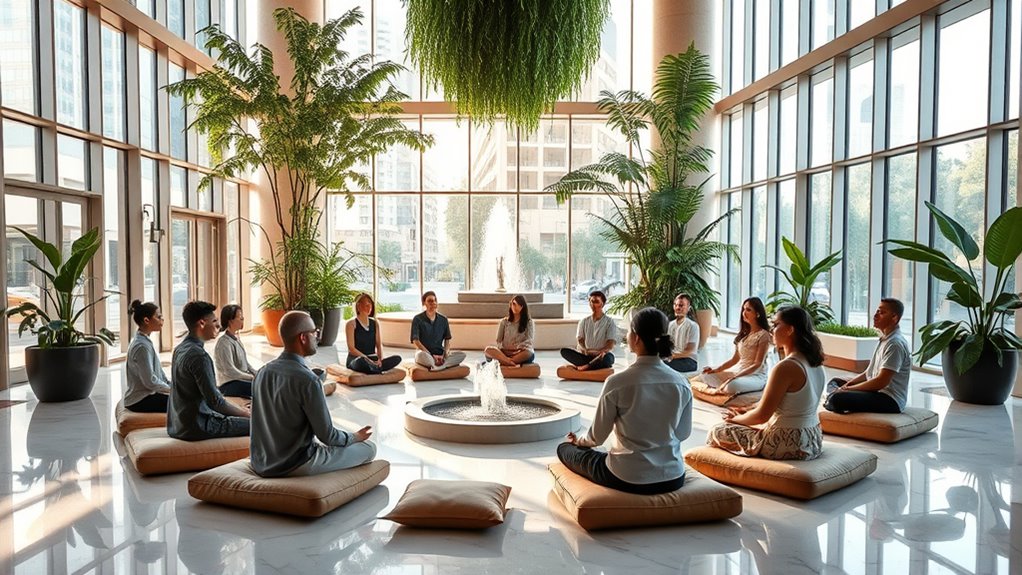Mindfulness is key for hospitality professionals looking to boost well-being and service quality in a fast-paced environment. By reducing stress and enhancing emotional intelligence, mindfulness helps you navigate challenging situations with ease. Incorporating mindful practices into your workday can improve focus and foster a positive atmosphere for guests. Plus, it promotes resilience and teamwork, driving overall success. If you’re curious about more ways to cultivate mindfulness in your career, there’s plenty more to explore.
Key Takeaways
- Mindfulness reduces stress and burnout, promoting emotional balance crucial for hospitality professionals in demanding environments.
- Incorporating mindfulness practices enhances emotional intelligence, improving interactions with guests and colleagues.
- Mindful breaks and breathing exercises during shifts help maintain focus and relieve tension.
- Practicing mindful listening fosters better communication and guest satisfaction.
- Implementing mindfulness programs cultivates a positive workplace culture, leading to increased employee performance and customer loyalty.
Benefits of Mindfulness in the Hospitality Industry

Mindfulness can be a game-changer for hospitality professionals, offering numerous benefits that enhance both employee well-being and guest experiences.
Practicing mindfulness reduces stress and burnout, helping you maintain emotional balance in a demanding environment. It also boosts your emotional intelligence, essential for navigating challenging interactions with guests and colleagues.
Practicing mindfulness enhances emotional balance and boosts emotional intelligence, vital for handling demanding interactions in the hospitality industry.
As you cultivate mindfulness, you’ll develop greater resilience, enabling you to cope with pressure more effectively. Moreover, it fosters a sense of meaningful purpose in your work, contributing to your overall mental health.
With these benefits, you’re not only improving your own well-being but also creating a positive atmosphere for guests, enhancing service quality and fostering loyalty, ultimately leading to a more successful hospitality experience for everyone involved.
Integrating Mindfulness Into Daily Work Practices

Incorporating mindfulness into daily work practices can significantly elevate the hospitality experience for both staff and guests. Start your day with short mindfulness sessions to set a positive tone.
During busy shifts, take mindful breaks to refocus with breathing exercises or a quick walk. Encourage slow, attentive eating during meal breaks, allowing for genuine nourishment.
Practice mindful listening during guest interactions to enhance communication and connection. Implement regular mindfulness training, focusing on customer service and team-building activities to create a cohesive environment.
Finally, reflect on your day’s challenges and accomplishments, helping you transition smoothly from work to personal time. These simple practices cultivate a more mindful and productive work atmosphere, benefiting everyone involved.
Enhancing Emotional Intelligence Through Mindfulness

While managing the fast-paced environment of hospitality, developing emotional intelligence (EI) is essential for creating meaningful connections with both colleagues and guests.
Mindfulness boosts your EI by enhancing self-awareness and emotional regulation. By practicing mindfulness, you can recognize and understand your emotions and those of others, improving your interactions. This emotional recognition leads to better job satisfaction and interpersonal relationships.
Mindfulness enhances emotional intelligence, fostering self-awareness and emotional regulation for improved interactions and stronger relationships.
Moreover, being mindful helps you balance your emotions, reducing emotional exhaustion and promoting empathy. In hospitality, these skills foster team harmony and enhance guest satisfaction.
Structured mindfulness training can significantly improve your EI, equipping you with the tools to resolve conflicts effectively and contribute to a positive work environment, ultimately elevating the overall guest experience. Additionally, techniques such as deep breathing techniques can help reduce tension and stress, further enhancing emotional regulation in high-pressure situations.
Mindfulness as a Tool for Stress Management

Amid the hustle and bustle of the hospitality industry, stress can quickly become overwhelming, but practicing mindfulness offers a powerful antidote.
Mindfulness techniques, like deep breathing and guided meditations, help you calm your mind and enhance focus, reducing errors in your work. By incorporating mindful movement, such as yoga or stretching, you relieve muscle tension and improve circulation, contributing to better emotional well-being.
Regular mindfulness practice not only boosts your resilience but also aids in maintaining a healthy work-life balance. Ultimately, as you manage stress effectively through mindfulness, you’ll find yourself more present and engaged, leading to improved guest experiences and stronger connections with your team. Additionally, embracing the Law of Attraction can help you manifest a positive mindset and attract favorable outcomes in your professional interactions.
Embrace mindfulness as a vital tool in your hospitality career.
The Organizational Impact of Mindfulness

Practicing mindfulness not only benefits individual well-being but also significantly influences the organizational culture within the hospitality industry. By fostering a culture of well-being, you enhance employee performance, crucial in high-pressure environments.
Mindful leaders build trust and authenticity, motivating their teams and creating a supportive atmosphere. This approach promotes innovation and creativity, vital for solving problems and adapting to challenges. As mindful employees exhibit greater resilience, they manage stress more effectively, leading to improved job performance.
Moreover, when your team feels engaged and aligned with organizational goals, customer satisfaction rises. Implementing mindfulness programs can shift the workplace culture towards well-being, ultimately driving success and enhancing the overall customer experience. Additionally, studies show that self-aware individuals experience higher job satisfaction, which can further contribute to a positive work environment.
Future Directions for Mindfulness Research in Hospitality

As the hospitality industry continues to evolve, exploring future directions for mindfulness research becomes essential for enhancing employee well-being and organizational performance.
You should focus on how mindfulness impacts employee stress reduction and emotional regulation. Research can delve into cultural adaptations of mindfulness practices, especially in low- and middle-income countries.
Investigating the integration of technology, like mobile apps for mindfulness training, can also be beneficial. Additionally, more studies are needed to understand mindfulness’s effects on job performance and customer satisfaction.
Consider conducting longitudinal studies to assess long-term benefits and employing mixed-methods approaches for comprehensive insights.
Addressing high staff turnover, work-life balance, and burnout prevention will further enrich the understanding of mindfulness in the hospitality sector.
Frequently Asked Questions
How Can I Start Practicing Mindfulness Today?
You can start practicing mindfulness today by taking a few moments to focus on your breath.
Find a quiet spot, close your eyes, and observe your inhalations and exhalations without changing them. Try using a simple word like “calm” to anchor your thoughts.
Additionally, engage your senses by noticing the sights and sounds around you.
Even a brief body scan can help you connect with your feelings and promote relaxation throughout your day.
Are There Specific Mindfulness Apps Recommended for Hospitality Professionals?
You’re diving into the world of mindfulness apps, and it’s like discovering a treasure chest of calm!
Headspace and Calm are your golden keys to stress relief, while Insight Timer and Meditation Timer let you craft your own peaceful oasis.
Tide, with its serene silence, wraps you in tranquility.
Pick one, or try them all! You’ll transform chaos into clarity and elevate your daily routine into a blissful experience.
Get ready to breathe easy!
What Are Some Quick Mindfulness Techniques for Busy Shifts?
During busy shifts, you can try quick mindfulness techniques to stay centered.
Focus on mindful breathing during short breaks to calm your mind. Consider walking meditation, syncing your breath with steps as you move between tasks.
Practice mindful listening during interactions for better communication. A moment of gratitude reflection can uplift your mood, while a one-minute grounding exercise allows you to reconnect with the present, helping reduce anxiety and enhance your focus.
Can Mindfulness Be Practiced While Interacting With Guests?
Absolutely, you can practice mindfulness while interacting with guests.
By focusing intently on their needs, you enhance your listening skills and create a more genuine connection.
Take a moment to breathe deeply and remain present during the conversation, which helps you respond thoughtfully.
Embrace a non-judgmental attitude, allowing you to understand their perspective better.
This mindful approach not only improves the interaction but also enriches your overall experience in the moment.
How Do I Measure the Effectiveness of Mindfulness Practices?
Measuring the effectiveness of mindfulness practices is like checking the temperature of a simmering pot—you need the right tools.
You can use surveys like the Mindful Attention Awareness Scale or the Five Facet Mindfulness Questionnaire to gauge your progress.
Additionally, psychophysiological measures like brain activity can offer insights beyond self-reports.
Conclusion
Incorporating mindfulness into your daily routine can transform not just your work experience, but also the atmosphere you create for your guests. Imagine a busy restaurant where each staff member takes a moment to breathe deeply before serving a table. That simple act can shift the energy, turning a hectic night into a memorable dining experience. By embracing mindfulness, you’re not just enhancing your well-being; you’re elevating the entire hospitality experience for everyone involved.










